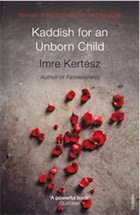The Reading Fairy has led me, in its characteristically capricious manner, from the bright bedding plants of frothy delight (Alan Bennett's Uncommon Reader) into the sterner, darker groves of Nobel prize-winning novelists. Not that Mr. Bennett's work didn't abound in intelligence and wit, nor was it lacking in perceptive and telling comments on how reading and books are regarded in British culture, and it had a great ending.
Anyhow, I've got a lovely bit of Mo Yan simmering on the back shelf, but at the moment I'm reading Kaddish for an Unborn Child, by Imre Kertész. This was a classic case of a book fixing me from the library shelves with its glittering eye; well, actually, with its elegantly minimal cover and intriguing title. The term Kaddish, a form of Jewish prayer, seems to be fairly free-floating, but Wikipedia clarifies that 'Mourners say Kaddish to show that despite...loss they still praise God'.
The book's narrator is a middle-aged (Hungarian) Jewish writer and, though I've only just started this novella, I've gleaned that it will explore parenthood or the lack of it, the search for a purpose in life and the Holocaust. An impressive score on the Big, Important Stuff Meter, then. It is written as a brilliantly-accomplished interior monologue which is intense, digressive and anguished, with long sentences meandering through each paragraph and turning back on themselves several times, and often requiring re-reading. Unless the gradual revelation of the narrator's life history be defined as such, there is no plot - nothing happens, but it does so in a very literary and profound way. I do, of course, offer myself as a hostage to fortune by posting a review of a book I've just started; it may be that after page 47 car chases, albino assassins and sparkling dialogue break out. I'll let you know. Reading Kaddish is like (so far) hitching a ride on the tortured, tortuous thoughts of the narrator as he responds to human and natural stimuli - it's quite mesmeric and very powerful. There is also excellent observational humour and some very good natural description.
There is a cultural thread for me here: one of the songs that first (belatedly, but hey, it's never too late for an epiphany) alerted me to the ineffable genius of Leonard Cohen was 'Who by Fire', which was also inspired by a Jewish prayer, and about which (I apologise for the neatness of this) I have a book, waiting to be read.
The Reading Fairy moves in mysterious ways, but I'm glad she visits libraries.

No comments:
Post a Comment